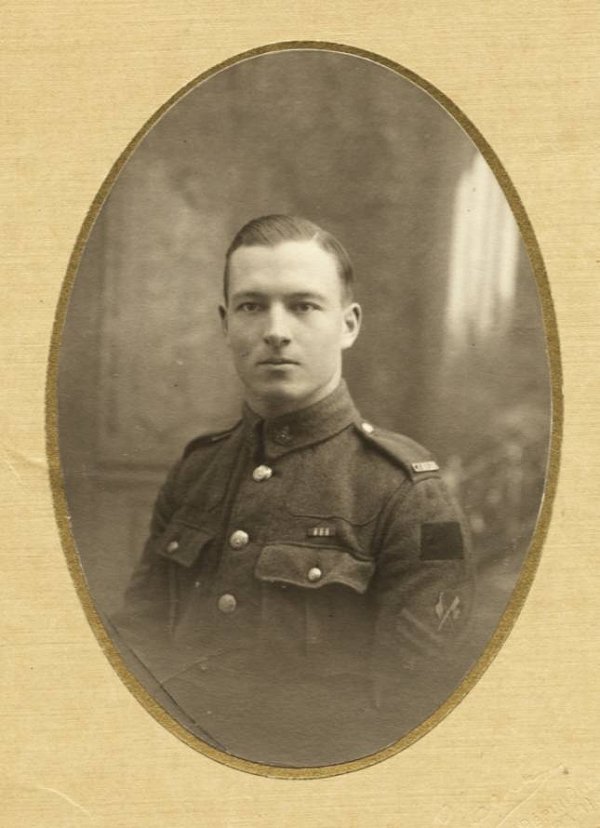Corporal Alexander McGregor McRae 147847 was born 9 November 1895 in Neepawa, Manitoba. Son of John, and Elizabeth Cameron McRae, of Winnipeg. He was a clerk. Alexander’s widowed mother lives in Neepawa. He is currently in the militia, with 100th Winnipeg Grenadiers. He attests with the 78th Battalion (Winnipeg Grenadiers) on 17 July 1915, at Winnipeg. Alexander stands 5’8″ tall, 145 pounds, with fair complexion, grey eyes and brown hair. He is Presbyterian.

Service
Alexander McGregor McRae appointed Lance-Corporal, in Canada, on 8 February 1916. Alexander’s unit sails, on 20 May 1916. They disembark at Liverpool, on 30 May 1916. Then, Lance-Corporal Alexander McGregor McRae immediately appointed Signal Lance-Corporal, at Bramshott Camp, 31 May 1916.
Western Front
The 78th Battalion disembark at Le Havre, on 13 August 1916. Later that month, Alexander appointed Lance-Corporal, on 24 August 1916. His second promotion to Lance-Corporal means he had reverted in ranks, in order to proceed overseas. Lance-Corporal Alexander McGregor McRae sent on a month-long Signal Course, 25 March 1917. Then, he rejoins his unit, on 23 April 1917.
Granted ten days leave to Paris, 12 August 1917. Then, he rejoins his unit, 23 August 1917.

Battle of Passchendaele
On 1 October 1917, the 78th Bn. marched to BERTHONVAL WOOD. By mid-October, they are training in Belgium at Poperinghe. Then, on 28 October, they move into the lines for the Battle of Passchendaele. During the battle, Alexander appointed Acting Corporal in the Field, 30 October 1917. His appointment in the field, brings news in mid-November. Then, on 3 November 1917, the 78th Battalion entrained at Ypres, and arrived at Caestre at 13h55. Then, they marched to Borre, about 5 kilometres away. Finally, the rest of the year spent training near Bruay, Pas-de-Calais.
Military Medal
For actions during the Battle of Passchendaele, Alexander awarded the Military Medal for Bravery in the Field. London Gazette No.30389 of 16 November 1917.
After leaving Bruay, the 78th Battalion moves from ALBERTA CAMP, Souchez. Then, to NIAGARA CAMP, Chateau-de-la-Haie on 3 January 1918. Then, the unit is entertained with ALADIN FRANCE. Presented by the 4th Divisional Concert Party, on 8 January. Finally, the next day, they entrain in a blinding snowstorm. At last, they relieve the 75th Battalion in the MERICOURT SECTOR.

Alexander is granted 14 days leave to Paris, 28 February 1918. Then, he rejoins his unit, on 15 March 1918.
Battle of the Drocourt–Quéant Line
On 2 September 1918, the 78th Battalion take part in the Battle of the Drocourt–Quéant Line. The battalion moves forward at ZERO-HOUR+1, in a mixed-unit formation. Casualties are high due to enemy machine gun fire. Then, the reporting of the casualties is confused with the mixed-units.
78th Battalion prepare to jump off, on the morning of 2 September 1918. At Vis-en-Artois Switch, the enemy opened a heavy barrage on the positons occupied by his section. The men take cover in the trenches. Then, about 06h15, an enemy shell explodes in the trench occupied by Corporal Alexander McGregor McRae. Alexander is seriously wounded. Firstly, Corporal McRae is immediately attended to, and placed in a field ambulance. Then, Alexander is evacuated to No.20 General Hospital, Camara, Rouen.
On admittance, GSW Right arm, fracture right arm, GSW abdomen, GSW left arm and back. McRae’s helmet prevents any head injury, but his multiple wounds are severe. Then, Alexander is reported as dangerously ill, the morning of 4 September 1918. Sadly, he passes away later that day.

Corporal Alexander McGregor McRae was buried in Etaples Military Cemetery, Plot LXVI, Row G, Grave 14.
Étaples Military Cemetery
During the Great War, the area around Étaples was the scene of immense concentrations of reinforcement camps, and hospitals. It was remote from attack. However, it was deliberately struck by multiple air raids in the Final German Spring Offensive. Étaples is accessible by railway from both the northern, or the southern battlefields.
Then, in 1917, 100,000 troops were camped among the sand dunes, and the hospitals. Included are eleven general, one stationary, four Red Cross hospitals and a convalescent depot. Eventually, they could accommodate 22,000 wounded, or sick. Then, in September 1919, ten months after the Armistice, three hospitals, and the Q.M.A.A.C. convalescent depot remained.
Corporal Alexander McGregor McRae survived the Battle of Amiens. He was involved in the action which saw the loss of the Hallu Eight.
More
Please subscribe to CEFRG to be notified by email when there are new posts. Subscription is free, and your email kept confidential.

Comments
One response to “Corporal Alexander McGregor McRae in the Great War”
[…] Clifford Moss’ award of the Military Medal will be published in the Supplement to the London Gazette, 11 February […]